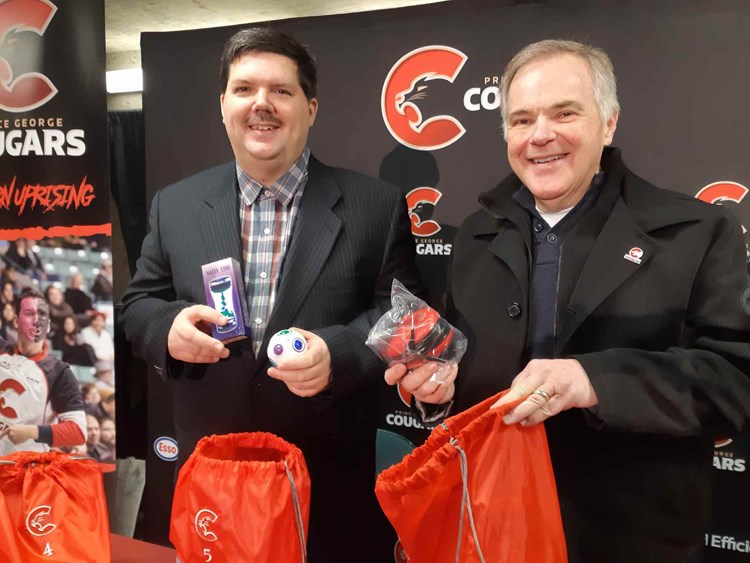The sights and sounds that come with attending a Western Hockey League game at CN Centre probably seem quite normal for the average hockey fan.
When the Cougars score, the crowd cheers, the horn sounds and people leap out of their seats as the lights go dim and the spotlight is trained on the players on the ice celebrating.
Blaring music during play stoppages is a constant presence during the game which helps charge the atmosphere of the event, and love it or hate it, people have come to expect it.
But not everyone is prepared for that experience.
People with autism react differently and sometimes unpredictably to having their senses stimulated and with that in mind, the Cougars have come up with a new strategy to make their home games more inclusive. They've developed sensory kits which include noise-cancelling head phones, ear plugs, glare-resistant glasses, squeezable stress-relief objects, Rubik's cubes, toys and colouring books to help encourage autistic hockey fans and their families to attend games at CN Centre.
"This is a package of items we will loan out to people who have issues with sensory overload," said Andy Beesley, the Cougars vice-president, business. "The noise, the lights, the people, the distractions, the craziness, everything that happens at a hockey game is normal for us. But for people that don't come to our games because of sensory overload issues, it would be completely overwhelming."
Beesley took the cue to make to Cougar games more sensory-friendly from Theatre Northwest, which offers relaxed performances to entice autistic audience members and parents with young children. The kits are used in by some NHL teams in their home rinks and the Cougars reached out to them for their input to develop the kits.
"The one thing we realized we could not realistically do was tone down our performances because people love the excitement of a hockey game, so this is a way of countering that for people and maybe muffling the sights and sounds for people who prefer a more calm background," said Beesley.
Corey Walker, the 41-year-old northern B.C. co-ordinator of AutismBC, was 22 when he was diagnosed with Asperger syndrome, a milder form of autism. He holds an English/history bachelors degree at UNBC and completed an instructor's diploma program at Vancouver Community College. As a kid growing up in the city he had trouble with the loud noises at hockey games which took him by surprise, sometimes to the point of irritation, so he stopped attending.
"It can be challenging for me because I have the sensory issues myself, especially when the music gets really loud and so I think this is going to make it more accessible and encourage me to come back to hockey games," said Walker. "That's one of the reasons I haven't attended, it gets really noisy and crowded. This will encourage a lot of people to start coming to games. This is just opening doors, it will make the games lot more accessible."
Walker is impressed with the efforts of the Cougars to try to entice him back to their games and is convinced the kits will help others prone to sensory overload enjoy their game experiences. He's hoping the kits will prove popular and the idea will be adopted by other sports and entertainment organizations in the city.
The Cougars will have the kits available at their guest services area and are encouraging people who want to give the kits a try to come to the rink during daytime hours to familiarize themselves with the arena and where they will be sitting during the games.
The Canadian government estimates one in 66 children aged 5-17 have been diagnosed with autism spectrum disorder. Boys are four times more likely than girls to be diagnosed as autistic. One-third of autistic patients have intellectual disabilities and one-third are nonverbal.
Because the symptoms and levels of severity of autism are so varied Walker says it is often misunderstood.
"To put autism in simple terms, it basically means your brain is wired differently - it affects the way your senses work and how you interact with people and you maybe process things differently," said Walker.
"It can cause developmental delays in some people as well. You have people who are nonverbal and you have people like me on the spectrum who are obviously very verbal, and you have what they call savants, people like (Albert) Einstein, who people believe were on the spectrum.
"People label us and paint us with one brush and think because you have autism you can't do this or can't do that. Well even if you have more challenges a lot of times you can do things, you just might require additional supports, but I think everyone deserves a chance."



